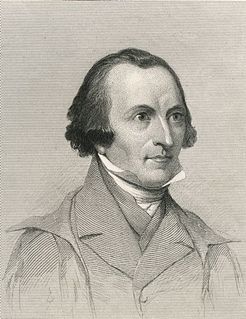Related Research Articles

Sir Edward William Elgar, 1st Baronet, was an English composer, many of whose works have entered the British and international classical concert repertoire. Among his best-known compositions are orchestral works including the Enigma Variations, the Pomp and Circumstance Marches, concertos for violin and cello, and two symphonies. He also composed choral works, including The Dream of Gerontius, chamber music and songs. He was appointed Master of the King's Musick in 1924.

James Gates Percival was an American poet, surgeon, and geologist, born in Berlin, Connecticut and died in Hazel Green, Wisconsin.
The Black Knight, Op. 25 is a symphony/cantata for orchestra and chorus written by Edward Elgar in 1889–93. The librettist borrows from Longfellow's translation of the ballad Der schwarze Ritter by Ludwig Uhland.
"Pleading" is a poem written by Arthur L. Salmon, and set to music by the English composer Edward Elgar in 1908, as his Op.48.
Oh, soft was the song is a song with words by Gilbert Parker set to music by the English composer Edward Elgar in 1910, as his Op. 59, No. 3. It is the second and last verse of a poem At Sea which Parker published in Volume I of a series of poems called Embers. The Opus 59 songs were part of a song-cycle of six romantic songs by Parker that was never completed – Nos 1, 2 and 4 were never composed. The other songs were Was it some Golden Star? and Twilight. The songs were originally written with piano accompaniment, but this was later re-scored by the composer for full orchestra.
"A Song of Autumn" is a poem by Adam Lindsay Gordon set to music by Edward Elgar in 1892.

Speak, Music! is a song written by the English composer Edward Elgar in 1901 as his Op.41, No.2.

The Torch is a song written by the English composer Edward Elgar in 1909 as his Op.60, No.1.

"Is she not passing fair?" is a song written by the English composer Edward Elgar.
”Dry those fair, those crystal eyes” is a poem by Henry King (1591-1669) Bishop of Chichester, set to music by the English composer Edward Elgar in 1899.

"Come, Gentle Night!" is a poem by Clifton Bingham set to music by the English composer Edward Elgar in 1901.

”Always and Everywhere” is a song by the English composer Edward Elgar with words translated from the Polish of Zygmunt Krasiński by Frank H. Fortey. It was composed and published in 1901.

"After" is a song written by the English composer Edward Elgar in 1895, as his Op. 31, No. 1, with the words from a poem by Philip Bourke Marston.

"A War Song", originally called "A Soldier's Song", was a poem written by C. Flavell Hayward and set to music by the English composer Edward Elgar in 1884.

The Starlight Express is a children's play by Violet Pearn, based on the imaginative novel A Prisoner in Fairyland by Algernon Blackwood, with songs and incidental music written by the English composer Sir Edward Elgar in 1915.
Coronation Ode, Op. 44 is a work composed by Edward Elgar for soprano, alto, tenor and bass soloists, chorus and orchestra, with words by A. C. Benson.

Caroline Alice, Lady Elgar was an English author of verse and prose fiction, who married the composer Edward Elgar.
Duett for trombone and double bass is a musical work by the English composer Edward Elgar.
(The) Language of Flowers may refer to:
References
- Banfield, Stephen, Sensibility and English Song: Critical studies of the early 20th century (Cambridge University Press, 1985) ISBN 0-521-37944-X
- Kennedy, Michael, Portrait of Elgar (Oxford University Press, 1968) ISBN 0-19-315414-5
- McVeagh, Diana M. (2007). Elgar the Music Maker . Woodbridge, Suffolk: Boydell Press. ISBN 978-1-84383-295-9.
- Young, Percy M., Elgar O.M. (Collins, 1955)